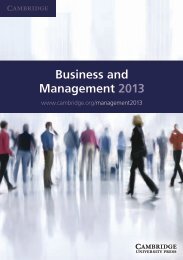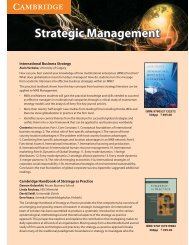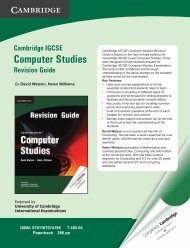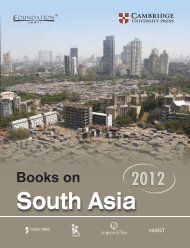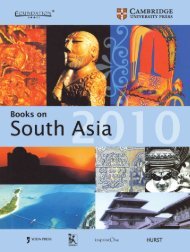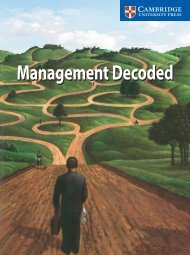India & Cambridge - Cambridge University Press India
India & Cambridge - Cambridge University Press India
India & Cambridge - Cambridge University Press India
- No tags were found...
You also want an ePaper? Increase the reach of your titles
YUMPU automatically turns print PDFs into web optimized ePapers that Google loves.
HISTORYModern HistoryReligion and Conflict inModern South AsiaWilliam GouldThis is one of the first single-authorcomparisons of different SouthAsian states around the theme ofreligious conflict. Based on newresearch and syntheses of theliterature on ‘communalism’, itargues that religious conflict in thisregion in the modern period wasnever simply based on sectarian ortheological differences or the clashof civilizations. Instead, the book proposes that theconnection between religious radicalism and everydayviolence relates to the actual (and perceived) weaknesses ofpolitical and state structures. For some, religious and ethnicmobilisation has provided a means of protest, whererepresentative institutions failed. For others, it became amethod of dealing with an uncertain political and economicfuture. For many it has no concrete or deliberate function,but has effectively upheld social stability, paternalism andlocal power, in the face of globalisation and the growingaspirations of the region’s most underprivileged citizens.William Gould is senior lecturer in <strong>India</strong>n history at the<strong>University</strong> of Leeds.6 maps9781107029217 368pp HB ` 895.00Subaltern Lives:Biographies of Colonialismin the <strong>India</strong>n Ocean World,1790–1920Clare AndersonSubaltern Lives uses biographicalfragments of the lives of convicts,captives, sailors, slaves, indenturedlabourers and indigenous peoplesto build a fascinating new pictureof colonial life in the nineteenthcentury<strong>India</strong>n Ocean. Movingbetween <strong>India</strong>, Africa, Mauritius,Burma, Singapore, Ceylon, the Andaman Islands and theAustralian colonies, Clare Anderson offers fresh readings ofthe nature and significance of ‘networked’ Empire. Shereveals the importance of penal transportation for colonialexpansion and sheds new light on convict experiences ofpenal settlements and colonies, as well as the relationshipbetween convictism, punishment and colonial labourregimes. The book also explores the nature of colonialsociety during this period and embeds subalternbiographies into key events like the abolition of slavery, theAnglo-Sikh Wars and the <strong>India</strong>n Revolt of 1857. This is animportant new perspective on British colonialism whichalso opens up new possibilities for the writing of historyitself.Clare Anderson is Professor of History at the <strong>University</strong> ofLeicester.18 B&W illustration 6 maps9781107032989 232pp HB ` 995.00Small Town Capitalism inWestern <strong>India</strong>: Artisans,Merchants and the Makingof the Informal Economy,1870–1960Douglas E. HaynesThis book charts the history ofartisan production and marketingin the Bombay Presidency from1870 to 1960. While the textilemills of western <strong>India</strong>’s biggestcities have been the subject ofmany rich studies, the role of artisan producers located inthe region’s small towns have been virtually ignored. Basedupon extensive archival research as well as numerousinterviews with participants in the handloom andpowerloom industries, this book explores the role ofweavers, merchants, consumers, and laborers in the makingof what the author calls “small-town capitalism.” By focusingon the politics of negotiation and resistance in localworkshops, the book challenges conventional narratives ofindustrial change. The book provides the first in-depth workon the origins of powerloom manufacture in South Asia. Itaffords unique insights into the social and economicexperience of small-town artisans as well as the informaleconomy of late colonial and early post-independence<strong>India</strong>.Douglas E. Haynes Dartmouth College New Hampshire.30 B&W illustrations 2 maps 12 tables9781107031296 362pp HB ` 895.00The Origins of IndustrialCapitalism in <strong>India</strong>:Business Strategies andthe Working Classes inBombay, 1900–1940Rajnarayan ChandavarkarRajnarayan Chandavarkar presentsthe first major study of therelationship between labour andcapital in <strong>India</strong>’s economicdevelopment in the earlytwentieth-century. He explores theemergence of capitalism in the region, the development ofthe cotton textile industry, its particular problems in the1920s and 1930s and the mill owners’ and the state’sresponses to them. The author also investigates how alabour force was formed in Bombay - its rural roots, urbannetworks, industrial organisation and the way in which itshaped capitalist strategies. In a subject dominated by theassumption of unities, Rajnarayan Chandavarkarconvincingly demonstrates the fragmentation of class, onthe side of both capital and labour. Their interactionorder online at www.cambridgeindia.org9





